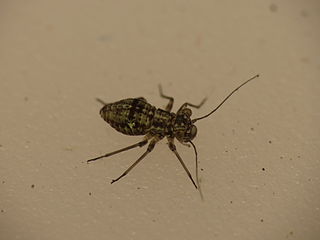
Trogiomorpha is one of the three major suborders of barklice, booklice, and parasitic lice in the order Psocodea, alongside Troctomorpha and Psocomorpha. There are about 8 families and more than 430 described species in Trogiomorpha. Trogiomorpha is widely agreed to be the earliest diverging of the three suborders, and retains the most primitive characteristics.
Asiopsocidae is a family of Psocodea belonging to the infraorder Caeciliusetae. The family is composed of 14 known species of barklice in three genera: Asiopsocus, Notiopsocus, and Pronotiopsocus. One species from each genus has been found in the United States.

Ectopsocidae is a family of Psocodea belonging to the suborder Psocomorpha. The family includes fewer than 200 species, most of them in the genus Ectopsocus.
Psilopsocidae is a family of Psocodea belonging to the infraorder Psocetae. Members of the family have a free areola postica and mottled wings. It is the only psocopteran family with records of wood-boring species. The family comprises one genus and seven species.

Psocodea is a taxonomic group of insects comprising the bark lice, book lice and parasitic lice. It was formerly considered a superorder, but is now generally considered by entomologists as an order. Despite the greatly differing appearance of parasitic lice (Phthiraptera), they are believed to have evolved from within the former order Psocoptera, which contained the bark lice and book lice, now found to be paraphyletic. They are often regarded as the most primitive of the hemipteroids. Psocodea contains around 11,000 species, divided among four suborders and more than 70 families. They range in size from 1–10 millimetres (0.04–0.4 in) in length.
Prionoglarididae is a family of the order Psocodea that are barklice characterized by the reduction or simplification of the lacinia in adults and the specialised form of the male genitalia. It contains the only known genus of animals, Neotrogla, where females possess a penis-like organ and take on typical male sex roles.

Lachesilla is the main genus in the psocopteran family Lachesillidae. There are at least 310 described species in Lachesilla. Frequent species in the Northern hemisphere include Lachesilla quercus and Lachesilla pedicularia. Some species are localized: Lachesilla merzi has been collected only once in Spain and Lachesilla rossica, apart from the original specimens that were found in southern Russia, is only known from the Valley of the Allondon river, near Geneva, Switzerland.

Neotrogla is a genus of barklice noted for its reversed sex roles and organs, traits shared by all species of the genus.
Bertkauia is a genus of insects in the family Epipsocidae. There are at least 2 described species in Bertkauia.

Mesopsocus is a genus of middle barklice in the family Mesopsocidae. There are more than 60 described species in Mesopsocus.

Trogiidae is a family of granary booklice in the order Psocodea. There are about 11 genera and more than 50 described species in Trogiidae.
Elipsocus is a genus of damp barklice in the family Elipsocidae. There are more than 20 described species in Elipsocus.
Asiopsocus is a genus of barklice, booklice, and parasitic lice in the family Asiopsocidae. There are about seven described species in Asiopsocus.
Psyllipsocus is a genus of cave barklice in the family Psyllipsocidae. There are more than 50 described species in Psyllipsocus.

Cerobasis is a genus of granary booklice in the family Trogiidae. There are at least 30 described species in Cerobasis.

Trichopsocus is a genus of lash-faced psocids in the family Trichopsocidae. There are about nine described species in Trichopsocus.
Cormopsocidae is an extinct family of Psocodea. All currently known members are from the mid-Cretaceous Burmese amber of Myanmar. The family is considered either to be the earliest diverging group of the suborder Trogiomorpha, or the sister group to all other psocids, and retains many primitive characteristics.
Prionoglaris is a genus of large-winged psocids in the family Prionoglarididae, of which it is the type genus. There are four described species in Prionoglaris, found in Europe and the Middle East.
Afrotrogla is an African genus of large-winged psocids in the family Prionoglarididae, discovered and described by Charles Lienhard. There are three described species in Afrotrogla, all found in certain caves of Namibia.
Siamoglaris is a genus of psocids in the family Prionoglarididae, the only one in the Indomalayan realm.







